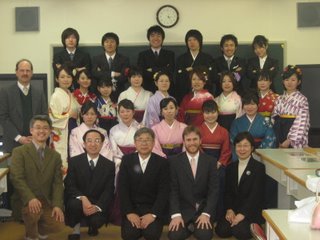
 On March 26, I gave a workshop titled "How can we succeed in teaching English in jr. and sr. high schools?". The workshop was sponsored by Iwate JALT and the Iwate University Faculty of Education. Althogether there were 20 people including me. The participants consisted of 6 American(to my knowledge) teachers, 2 teachers and research fellows from the Philippines, 2 graduate students from China, 7 Japanese university students (most of them had experience teaching), a translator, a Japanese teacher of English, and a Japanese Univeristy Professor. It was an excellent mix of people from different backgrounds and the number of participants was just right.
On March 26, I gave a workshop titled "How can we succeed in teaching English in jr. and sr. high schools?". The workshop was sponsored by Iwate JALT and the Iwate University Faculty of Education. Althogether there were 20 people including me. The participants consisted of 6 American(to my knowledge) teachers, 2 teachers and research fellows from the Philippines, 2 graduate students from China, 7 Japanese university students (most of them had experience teaching), a translator, a Japanese teacher of English, and a Japanese Univeristy Professor. It was an excellent mix of people from different backgrounds and the number of participants was just right.The goal of the workshop:
As the title suggests the goal of the workshop was to discuss how we can improve English education in Junior and Senior high schools. We were to do this by sharing our own teaching stories and learning from them.
I tried to make the topics of the discussion concrete. To do this, I gave the participants the following information at the beginning of the workshop:
According to second language acquisition theory the following two conditions are necessary for language learning:
Condition 1) Learners should have plenty of exposure to the target language and the language that they hear should be comprehensible for their level of proficiency
Condition 2) Learners need the opportunity to use the target language to communicate meaning and test their knowledge either by speaking or writing.
These conditions, 1, providing learners with written or spoken input that they can understand, and, 2, encouraging learners to use the target language in speaking and writing so that they can test and develop their understanding of the language, seem easy to provide but in reality can be difficult in the Japanese junior and senior high school classroom.
I hoped that the participants would share some of their strories of successful or non-successful language learning activities they designed so we could come up with conclusions as to how we could provide conditions 1 and 2.
What did we do?
1. Spanish Lesson
After the ice-breaking, I gave a demonstration Spanish lesson to show how condition 1 might be met. I used mostly Spanish during the lesson. I used English toward the ending to confirm the meaning of the new words and talk about the masculine and feminine word rule in Spanish. At the beginning of the lesson, I showed a video to the participants. The video was of my trip to Thailand. It showed the following images accompanied by the following captions: a train station (esta es una estacion), a train (esto es un tren), a street (esta es una calle), a boat (esto es un barco), a man (esto es un hombre), a woman (esta es una mujer), a very female looking man (esto/esta es un/una ?), another very female looking man (???), a school (esta es una escuela) and a market (Esto es un mercado).
(The video can be viewed by clicking here. I was introduced to an amazing site to upload your videos on. You should be able to watch the video soon after clicking on the link. )
I read the captions while we watched the video. We watched the video twice. Next I showed pictures of each image accompanied with their original captions. I confirmed the meaning of the sentences. Then we practiced saying the sentences, but as we did this I gradually took out words from each sentence as we practiced saying them. The purpose of doing this was to make the learners aware of the masculine/ feminine word rule in Spanish. The power point file I used to do this can be seen here.
The purpose of this exerice was to show how pictures, creativity, and a low-key atmosphere can make a foreign language comprehensible to learners who have never studied it before. In other words, it served as a suggestion as to how condition 1 can be supplied.
2. My story of a lesson that did not go well:
Secondly, I shared an experience where I taught a "demonstration class" or 研究授業 to 40 junior high school students. The goal of the lesson was to get them to use English communicatively by conducting a survey to find out the classes favorite television show. In other words, the goal was to provide the students with condition 2. The class did not go well and I learned the following lessons:
1) Never do too many new activities at one. If a teacher wants to try something different and the students are used to a particular learnings style, he should make gradual changes. My lesson was too drastic.
2) The class group should be cohesive meaning that members have to feel accepted by their peers, not necessarily likes. The teacher also should be an accepted member of the group. I was not an accepted member of the group.
3) Quite often a class will have norms that make it difficult to conduct communicative language activies. An example of detrimental norms are:
•"We are not good at English."
•"We will not speak in front of our classmates. "
•"A class is where a teacher speaks and the students listen."
The teacher must negotiate new norms with the students but this is done over the span of weeks or months.
3. Group Discussion:
After my presentation we took a break and then broke into 4 groups of 4 to 5 people. We had about an even number of teachers and students per group. It was a great mix! I gave groups the choice of one of two very specific topics:
- Please discuss some of your experiences with each other; what listening-focused activities have been easy (or difficult) for your students to understand. Why?
- Do you have any stories of successful lessons or unsuccessful lessons where the goal was to get students to use new language communicatively? Why was the lesson successful or why was the lesson not successful?
MB, an English teacher from the USA, said:
- Music can be useful in relaxing the class and changing the atmosphere for the better. It can also help students pick up and understand vocabulary. A combination of music and movement can help children learn English.
- (quoting what she heard in a previous presentation) “the basic building block of English lessons is building relationships
- Music can be effective but we have to remember that some of the songs that children like might be too difficult. We need a balance between what children like and what is possible.
- Establishing human relationships with students is most important.
RC, a Mathematics teacher and research fellow from the Philippines, listed the following important points:
- Teachers should give importance to motivation and materials
- the needs of students
- the capability of students - Teachers should make the lesson lively by showing pictures, songs, and establish rapport (good relationship)
- Teachers need to unlock difficult words, which means provide a means for students to understand difficult words.
- There is a saying in China that if we really want to win the war you have to understand your own strengths and weaknesses as well as the enemy's. To be an effective teacher it is not only important for the teacher to understand his students but also his own strengths and weaknesses. The teacher when choosing his teaching style should make his decision based on what style will work particularly for him.
Good Points:
The atmosphere was great and almost each group had an American speaker of English, a Japanese speaker of English, either a Philippine or Chinese speaker of English. I thought this combination of different perspectives made the small group discussions work well. As a teacher, it was very rewarding to see my students from the university participate actively in the discussion. Each one of us on that day met someone new and that also made the experience very memorable. One of the main messages from that came from the workshop was that knowing and building a good relationship with your students is one of the most important elements in creating a good language learning environment. Personally, knowing the importance of establishing a good, trusting relationship with the students and maintaining it through the inevitable ups and downs will have an influence on how I teach my university classes. It will also influence how I do my future "demonstration classes" at elementary, junior, and senior high schools. Perhaps the foundation of effective teaching is establishing trust and on top of the foundation comes technique.
Points of Improvement:
The workshop was a little disorganized on my part and I think that I could have done a better job in relaying to the participants what the purpose of the demonstration lesson and my story telling was. I also spent too long talking and should have given the participants more discussion time. Lastly, the discussion topics seemed to be a little difficult to talk about because they were too specific.
To the Participants,
If I have left out something important, made a mistake, or you would just like to say something please write a comment!



